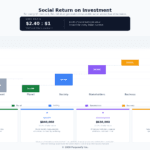Global Companies Launch Carbon Measures to Create Standard Framework for Carbon Accounting

• Coalition includes ExxonMobil, BASF, ADNOC, BlackRock’s GIP, Banco Santander, and others, spanning energy, finance, and industry.
• Initiative to create ledger-based global carbon accounting system addressing accuracy, double counting, and product-level standards.
• Framework aims to reshape industrial emissions tracking and inform policy, investment, and carbon-intensity markets.
Leading Firms Unite to Standardize Carbon Data
A consortium of global industrial, financial, and energy leaders has launched Carbon Measures, a coalition seeking to create a standardized, market-ready framework for carbon accounting across industries and products. The group aims to correct widespread inconsistencies in current emissions reporting and enable governments, investors, and companies to base climate decisions on verifiable, comparable data.
Founding members include ADNOC, Air Liquide, Banco Santander, BASF, Bayer, CF Industries, EQT Corporation, ExxonMobil, EY, BlackRock’s Global Infrastructure Partners (GIP), Honeywell, Linde, Mitsubishi Heavy Industries, Mitsui & Co., Mitsui O.S.K. Lines, NextEra Energy, Nucor, the Port of Rotterdam, and Vale. Additional members are expected to join in the coming months.
The coalition’s stated objective is to apply the precision of financial accounting to carbon management—creating a transparent, ledger-based system that reduces double counting, closes data gaps, and drives comparability. By doing so, Carbon Measures hopes to empower markets to price emissions more efficiently and accelerate low-carbon investment.
From Reporting to Measurable Market Impact
The coalition’s initial focus will be twofold: developing a universal carbon accounting methodology and defining carbon intensity standards for industrial products such as electricity, fuel, steel, concrete, and chemicals. These commodities form the backbone of global supply chains and collectively account for most industrial emissions.
The proposed framework would introduce a rigorous, verifiable approach to product-level emissions data, designed to inform both investors and regulators. It also seeks to unlock competition—rewarding producers that invest in low-carbon technologies and enabling consumers and governments to assess emissions performance objectively.
“Accurate and transparent calculation of carbon emissions at origin is the foundation for meaningful climate action,” said Ana Botín, Executive Chair of Banco Santander. “This initiative creates a reliable, globally comparable way to calculate carbon intensity across each step of the value chain, enabling standards that can accelerate the transition.”

New Leadership and Industry Backing
Former EY Global Vice Chair for Sustainability, Amy Brachio, has been appointed CEO of Carbon Measures. At EY, she led the firm’s global sustainability strategy and oversaw emissions reductions of 40%.
RELATED ARTICLE: SAP Launches SAP Green Ledger, a Carbon Accounting and Reporting System
“Good data leads to good decisions,” Brachio said in a statement. “For decades, businesses have struggled with systems overly reliant on estimates and voluntary pledges. Carbon Measures will establish a platform that unleashes markets and competition, unlocking investment and accelerating emissions reduction.”
Support from industry leaders has been unequivocal. François Jackow, CEO of Air Liquide, said collaboration across sectors is “essential to reward low-carbon solutions and harness the power of markets.” ExxonMobil’s Chair and CEO, Darren Woods, added: “If you can’t measure it, you can’t manage it. Today, we don’t have an accurate system to do this. A standard methodology provides the foundation to mobilize market forces while meeting growing energy demand responsibly.”

Nucor Corporation’s CEO, Leon Topalian, called the coalition “critical to ensuring comparability across industries and supporting credible progress toward emissions reduction.”
Implications for Global Climate Governance
Carbon Measures arrives as governments and investors face mounting pressure to align industrial data systems with climate commitments under frameworks such as the Paris Agreement and the International Sustainability Standards Board (ISSB). Current carbon reporting mechanisms—often fragmented and voluntary—have produced inconsistent results, limiting their usefulness for policy and capital allocation.
A unified global accounting framework could help close the gap between national disclosure regulations and corporate reporting, while establishing a credible foundation for carbon border adjustments, trade alignment, and performance-based financing.
For executives, the coalition’s work may redefine how emissions intensity is priced and managed across supply chains. For policymakers, it could enable evidence-based rulemaking grounded in comparable carbon data.
By converging industrial precision and financial discipline, Carbon Measures seeks to establish the infrastructure for a transparent carbon economy—one where data integrity underpins competition, investment, and the pace of global decarbonization.
Follow ESG News on LinkedIn












